Country Music Star Chase Rice Found a Roundabout Way to Realize His NFL Dreams
Chase Rice could hear it in the silence.
The murmurs of fans started to echo throughout the concrete corridor as he and his team got closer to the field. Their huddles gave Rice a nostalgic feeling of high school football as they chanted, “Good, better, best. Never let it rest, until your good gets better and your better gets best.” As Rice followed the familiar-feeling concrete path, it mirrored the walks he made as a North Carolina football player. But when he stepped onto Ford Field, the chatter turned into a steady, ear-piercing roar as more than 74,000 fans welcomed him to Detroit.
He couldn’t help but smile as he looked around the Lions’ stadium that night in February 2020. The rush of being on the field surrounded by fans in the stands, the adrenaline pulsing through his body just like before every game. Rice had finally realized his dream of playing in an NFL stadium, but it looked differently than he once expected it might.
Instead of an opposing team and a pigskin, he was greeted by a 360-stage and a microphone stand, as the former linebacker opened for country music legend Garth Brooks.
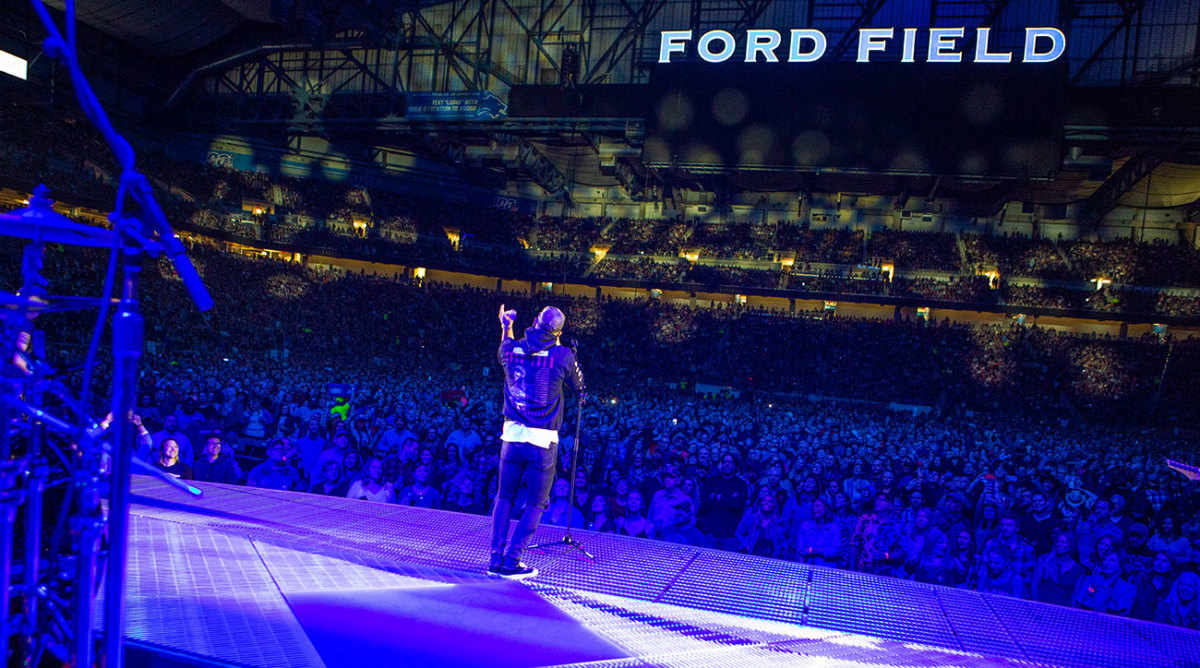
Rice hit the ground running with “Lions,” fitting for the venue. As he moved through his upbeat half-hour set, he suddenly pulled an Ed Sheeran on the crowd.
He donned his acoustic guitar, slowing down the crowd as he strummed the opening notes of “Jack Daniels & Jesus.”
I’ve taken a ride in the devil’s Cadillac,
I’ve been so high thought I wasn’t comin’ back,
And just when I think I’m too far-gone,
Ringing in my head’s the 23rd Psalm.
The last time Rice had been to a Garth Brooks concert with his brothers was in 1998 in Charlotte. Now, he was opening for one of his childhood heroes in an NFL stadium with his family in the stands, performing a song that changed the trajectory of his life.
“It’s deep; it’s real,” Rice says. “Songs are meant to pull out emotions, good or bad. And that one pulls out emotions that if it can save a life, you can’t really ask to write a song better than that.”
In a way, the song ultimately saved him. Rice has taken his own ride in the devil’s Cadillac—watching his NFL dreams implode, when his father’s sudden death just before a senior year of college already full of unknowns. From being a part of Ryan Newman and Jimmie Johnson’s pit crews and going on Survivor: Nicaragua, to writing “Cruise” with Florida Georgia Line and making it in Nashville, Rice kept his head down, eyes up as he figured out who he is and navigated his wild ride to redemption.
“Everything that is a blessing is a curse,” Brooks says, “and everything that is a curse is a blessing.”

“Carolina Can”
Rice may embody what it means to be a North Carolinian, but he was actually born in Florida and grew up on Gators football.
While he would ultimately become a football star, he played a variety of sports when he was a little kid, including soccer. That’s how he became friends with Florida Georgia Line’s Brian Kelley. The two met when they were four or five years old, and eventually played on the same youth soccer team with yellow jerseys and Rice’s dad as coach.
“I remember going out to his family’s farm off State Road 40 in Ormond, and we would go have these church events,” Kelley says. “They’d have the most bada-- slip-and-slide situation. They had like a lake on their property, and we’d go tubing and kneeboarding.”
It wasn’t until Rice was 11 that his family moved to a small tobacco town just outside of Asheville, N.C., but the two remained friends. Kelley said the move probably connected the duo more than expected, as he and his family would travel to North Carolina to visit during the summers and Rice would visit Florida.
Growing up, Kelley remembers singing along to Kenny Chesney with Rice, and the young football star’s athletic mentality later impacted his musical side.
But football held the driver’s seat, at least for a while. A.C. Reynolds High School was a powerhouse in North Carolina. Rice’s older brothers won a state championship with the program, and both were offered scholarships, one for football and the other for baseball.
“I had a lot of big shoes to fill coming from the youngest brother of two older brothers that had won state championships, that got scholarships,” Rice says. “And then all of a sudden, here I am. If I don’t do it, in my mind, I’d be a failure.”
In 2002, Rice snagged a ring of his own as Reynolds won another state championship. The Charlotte Observer ranked him among the 25 best players in the state, and he received an offer to play for UNC.
Rice had already made a name for himself before he could sport his “faded blue denim on Franklin Street,” but his football skills aren’t a part of the first impression one of his teammates and longtime friends remembers.
“He’s gonna kill me for saying this, but he was wearing cargo jean shorts, and I’m from the beach so I feel like I have a little more style,” jokes Connor Barth, who played nine seasons in the NFL. “I was like, ‘Man, we gotta fix this man. He can’t be wearing this anymore.’ ”
Barth and Rice became fast friends and ended up living together during their second year. And that was the year Rice learned how to play the guitar, thanks to Ben Lemming, a center on the team. At the time, it was still just a hobby, but Barth remembers that Rice kept getting better and better. Barth remembers thinking, “Man, where did this come from?”
Meanwhile, Rice continued to flourish on the field and in the weight room, finding himself in a starting role halfway through his sophomore campaign.
“He just had this freakish athletic ability that I’ve never really seen,” Barth says.
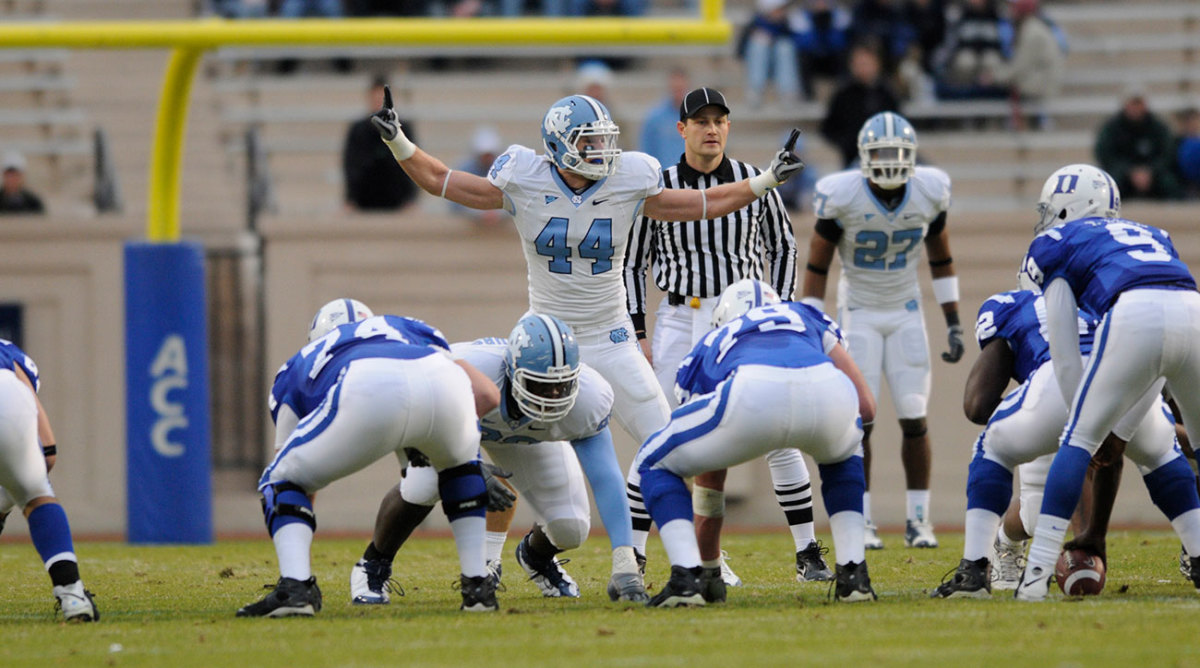
“Heads Down, Eyes Up”
September 1, 2007. James Madison at North Carolina.
That Saturday night game was supposed to be a turning point for Rice. The Tar Heel linebacker had played in all 12 games during his sophomore season and started three. And he was slated to join the starting lineup as a supposed permanent member starting with his junior season opener.
In the second quarter, James Madison’s quarterback rolled out and Rice went to make what should have been a standard hit, one he’d done countless times before. But this time, his foot stayed on the ground, his body going right as his foot went left. Rice knew immediately that something was off.
The final verdict was a season-ending torn tendon in his left ankle, which required surgery.
“The weird thing about when you get hurt at the college level, or the next level, is that it can be a very lonely place because you might be doing rehab while everybody else is in meetings,” says Garrett Reynolds, a former UNC teammate and longtime friend. “And then everybody’s at practice while you’re doing more rehab. … So being injured can be a very lonely and very, I would almost say, isolated place. Your teammates are still gonna be around you, but it’s just an individual battle that you got to knock out on your own.”
Rice’s injury gave him a brief glimpse of what a regular college experience looked like outside of athletics. Out of boredom, Rice says he leaned more into learning how to play the guitar, and he even explored the bar scenes and frat parties. But football remained his focus because he knew early on he “had an opportunity to pay my bills for the rest of my life just from an NFL football career.”
Reynolds says he remembers Rice being in the weight room whenever they were lifting, and even though he couldn’t do legs, he was working on everything else. And when the team went on runs during the offseason, Rice would lift upper body twice.
Even with seemingly being on the outside, Barth says Rice continued to be a leader and even an inspiration to the younger players.
“He would be up every morning doing his rehab, and then he would make sure to be around the younger guys in the locker room and kind of mentor them,” Barth says. “If he couldn’t be there on the field, at least he could be there watching the film with them and teach them different things that he’s learned over his first couple years.”
The linebacker remembers one moment during his rehabilitation process when he caught his reflection in the mirror, seeing himself in a way he hadn’t before. Rice’s head was down, but his eyes were up, and that became his personal motto as he fought for a chance to get back on the field. Eventually, this mantra would become the name of his charity, The Heads Down Eyes Up Foundation, and his apparel brand.
Come spring 2008, it looked like Rice had a chance at winning his job back. Things had finally turned around for him—again. That is until a phone call from his mom came out of the blue one May morning.
“Come home,” she told him. “Dad died.”
Rice’s father, Daniel, had passed away from a heart attack.
“[My injury was] a freak accident, something you can’t really control,” Rice says. “But when that kind of thing happens and then you lose your dad a few months later, there’s only one or two ways to go at that point—spiral downwards or figure it out.”
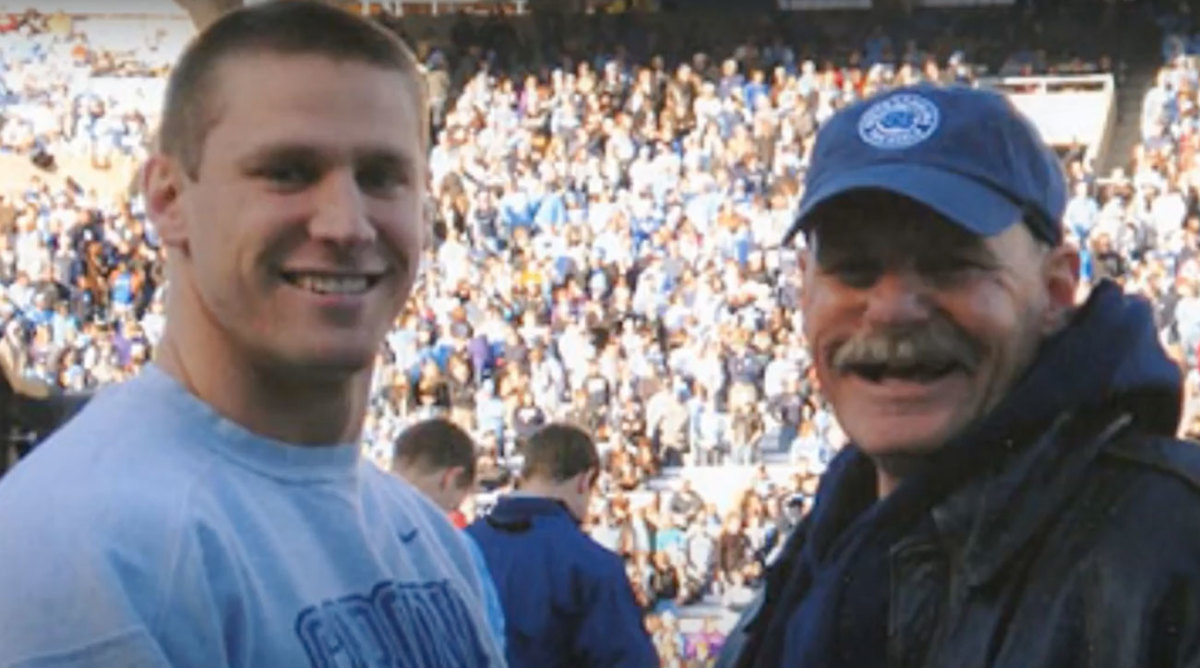
“Friday Nights & Sunday Mornings”
Rice chose to figure it out, but he’ll be the first to admit that he spiraled for the first half decade following his father’s death.
He remembers really leaning into his faith during the first week or so, thinking, “O.K., I know I can get through this. God, help me out. I’m not gonna drink.” But things took a turn when he returned to Chapel Hill, and he became mad at the world for losing his dad.
Rice acknowledges he drank more than he ever had before during this stage of his life, but his friends are quick to defend him, saying he “handled it as good as anybody can, especially at that age” and was “always under control.” Even when he wanted to isolate, Reynolds says they made sure to include Rice.
“Everything we went to go do, we all did in the group,” he says. “Always keeping him around, trying to keep him busy, when we weren’t at the house.”
And even though Barth had already left for the NFL, he said he could tell Rice was as focused as ever on football.
But then one of the younger players Rice had mentored took his starting spot. The senior still made an impact on the team, showing that he could still be similar to the player he’d been. The moment to prove it came when Rice started against Duke. Not only did the Tar Heels walk away with the Victory Bell while playing in the stadium Rice had watched his brother play in during college, but the linebacker tallied a career-high 10 tackles.
“I was able to prove that if I would have had the chance,” Rice says, “I know I could have done bigger, better things on the field.”
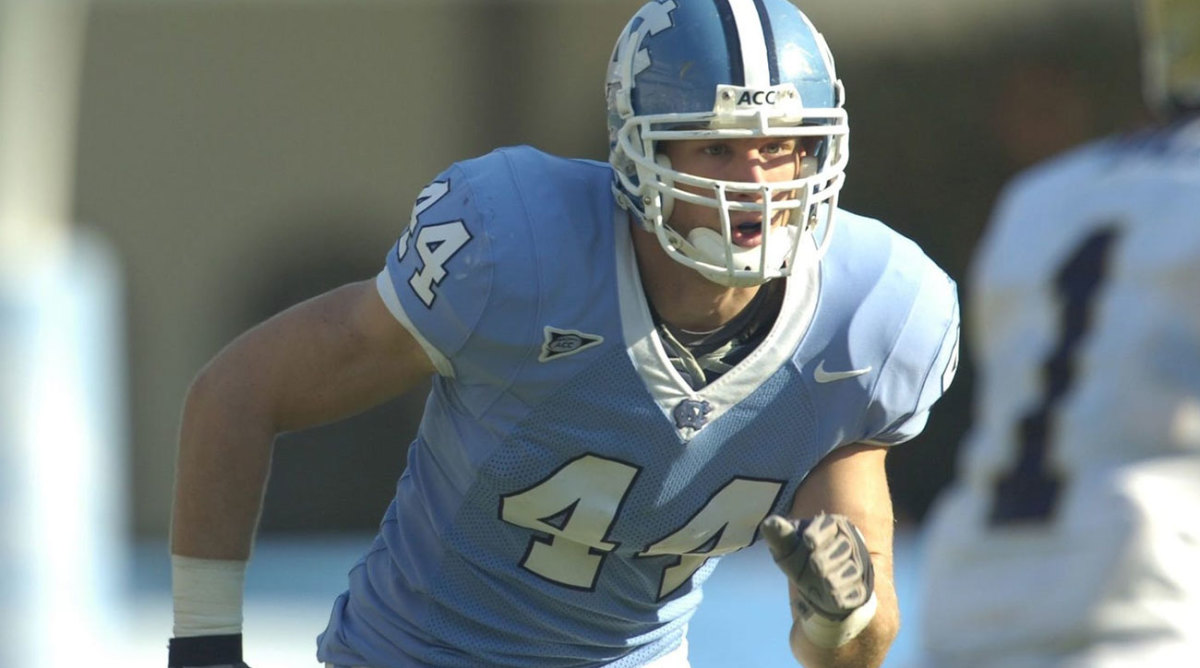
Rice remembers saying that his senior season would be dedicated to his dad, but hindsight being 20/20, he admits he didn’t step up and play as well as he could have. Deep down, he was bitter. Rice tried therapy but only lasted for one or two visits.
“You can’t force anybody to go get help,” Rice says. “I didn’t know I needed it. I didn’t think I needed it. To be honest with you, I’m glad I didn’t get it because it led to other stuff that’s led to where I am now. It led to the depression. It led to the awful times in my life. It led to the success. But all that led to a valley in my life that I wouldn’t change if you gave me the option. I would live through it and it sucks, and that’s part of life.”
His guitar ended up being his saving grace, and the first song Rice wrote—“Larger Than Life”— was, of course, about his dad. And it was Kelley who helped him finish it. At first, Rice started writing music as a way to get out what he was feeling, “the hatred and the pissed-off anger, the sadness.”
At that moment, his music career began. One song eventually turned into 13 as Rice pieced together his first album, “Friday Nights & Sunday Mornings,” which was released in 2010.
“His outlet to kind of cope with everything was to start writing and playing more. That was his way of dealing with everything in a positive way,” Barth says. “It’s helped him so much. I mean, he’s written some amazing songs, and I think it all started there with his dad’s passing. He dedicated that season to him for football, but then that’s when I saw him really starting to pick up the guitar more and really play, and it seemed that this could be a career that he could take on.”
Even though Rice was lost after his father died and still fighting to prove he was back from his injury, he still thought he had a chance to make it to the NFL. Rice remembers giving it his all during North Carolina’s pro day, and says some of his measurables were better than wide receiver Hakeem Nicks, whom the Giants picked 29th in the 2009 draft.
But Rice never got the call.
“It was depressing as hell”
The roar of the car engines enveloped the speedway as the smell of burning tires striking asphalt filled the air. Rice stood among the Nationwide Series (now called the Xfinity Series) pit crews, waiting for Ryan Newman to come to a screeching halt down pit road.
Chris Burkey, a graduate assistant for the UNC football staff, had moved on to become part of Hendrick Motorsports’ pit crew development program. The organization was in the process of changing pit road methodology by recruiting former athletes who missed the professional cut. Given Rice’s athletic prowess, Burkey invited him to try out.
The former football player soon joined one of NASCAR’s most prestigious organizations, and he worked as a rear tire carrier for Newman. Rice later went on to help Jimmie Johnson’s crew, winning a Sprint Cup Series championship during his time there, and worked under legendary crew chief Chad Knaus.
For Rice, it was a dream come true, a hidden blessing to the curse of his football career’s end. Racing is in his blood. He said his father had been a racer, once winning his class in what is now the Rolex 24 at Daytona.
But Chase’s heart wasn’t in racing, or living in Charlotte.
“It was depressing as hell, to be honest. I hadn’t dealt with any of the things I needed to deal with,” Rice says. “Not to mention, I wasn’t making a lot of money when I first got to Hendrick Motorsports, barely enough to pay for where I was living.”
At first, he lived in a hotel with another pit crew member, but Rice said the guy hated him because Rice would play his guitar and write songs when they got home. Eventually, Rice moved into a house with one of his college roommates, who played for the Panthers, for a couple of months.
“I was living this really cool life working NASCAR for a great team,” Rice says. “But all I wanted to do is move to Nashville and do music. I was doing open mikes across Charlotte, and I just knew that if I got the experience that … I can’t say that I knew that I’d be good because I wasn’t near good enough. When I moved to Nashville, I wasn’t near good enough.
“But for some reason, I had the confidence to know that if I just keep going at it, that I think I have a thing that nobody else has. And when you have something that nobody else can give the world, you got to give it.”
Performing at those open mike nights was lonely and scary, Rice says, but he continued to go because it challenged him. There were other singers who were way better than he was at the time. His athletic mindset kicked in, and Rice wanted to eventually get on the stage and be better than everyone else.
“Luke Combs can tell his story. Sam Hunt can tell his story. Florida Georgia Line can tell theirs, but I’m the only one that could tell mine,” Rice says. “So it’s a challenge every night to get up there and tell mine the best way you can. And for me, that’s through songs that I’ve written and the way that I sing them that night.”
Meanwhile, his lack of desire for NASCAR hindered him from being great at his new day job. And it showed.
Rick Hendrick had a chaplain come in once a week and hold a chapel for the employees during lunch. It was a free meal, and Rice admits that’s why he started going at first. But one day, the young twentysomething decided to talk with the chaplain about his desire to go to Nashville for music, despite never having visited the city before.
The chaplain said, “What are you doing here? Figure it out, go to Nashville. There’s no reason for you to be here if you don’t want to be here. You’re young enough to where even if it doesn’t work out, you can figure it out after that. But you need to go chase that.”
Several weeks later, Rice got suspended for two weeks after getting into a fight and hitting a pit crew member at Martinsville Speedway. Taking the chaplain’s advice, Rice called Kelley, who was living in Nashville with Tyler Hubbard at the time, and asked whether he could visit them.
Hubbard and Kelley had just started piecing together Florida Georgia Line when Rice visited during his two-week suspension, Rice says. As the trio took the town by storm, Rice fell in love with Nashville because, unlike in Charlotte, he finally had friends and a family, and he felt like he had a purpose.
After Rice got a glimpse of a dream that had been in the back of his mind since college, he briefly returned to the NASCAR grind. But then, Survivor: Nicaragua knocked on his door. Rice jumped at the opportunity.
“When he got on the show, I was like, ‘Are you kidding me? Of course he gets on the show,’ ” Reynolds says. “Because he’s the one person I’ve never worried about in my life because something will work out and it’ll all be O.K.”
Rice ended up one vote shy of winning the million-dollar prize, which he lost to Judson “Fabio” Birza. But when Rice returned to NASCAR, the pit crew coach took one look at him and said, “You can’t do this job right now.” Rice estimates that he lost more than 30 pounds while on Survivor.
He originally returned to Asheville to work on gaining the weight back, but when he was home, Rice decided to visit Kelley and Hubbard in Nashville again instead. The trio were talking one night at Tin Roof, their favorite bar, and Rice said the drunker they got, the better the idea sounded of his moving in with them.
“It was just the perfect time for everybody to do something a little crazy in terms of chasing a dream,” Kelley says. “We were doing the same damn thing.”
Hubbard adds, “We were fresh out of college. Had nothing to lose and everything to gain and we were just young and big dreamers.”
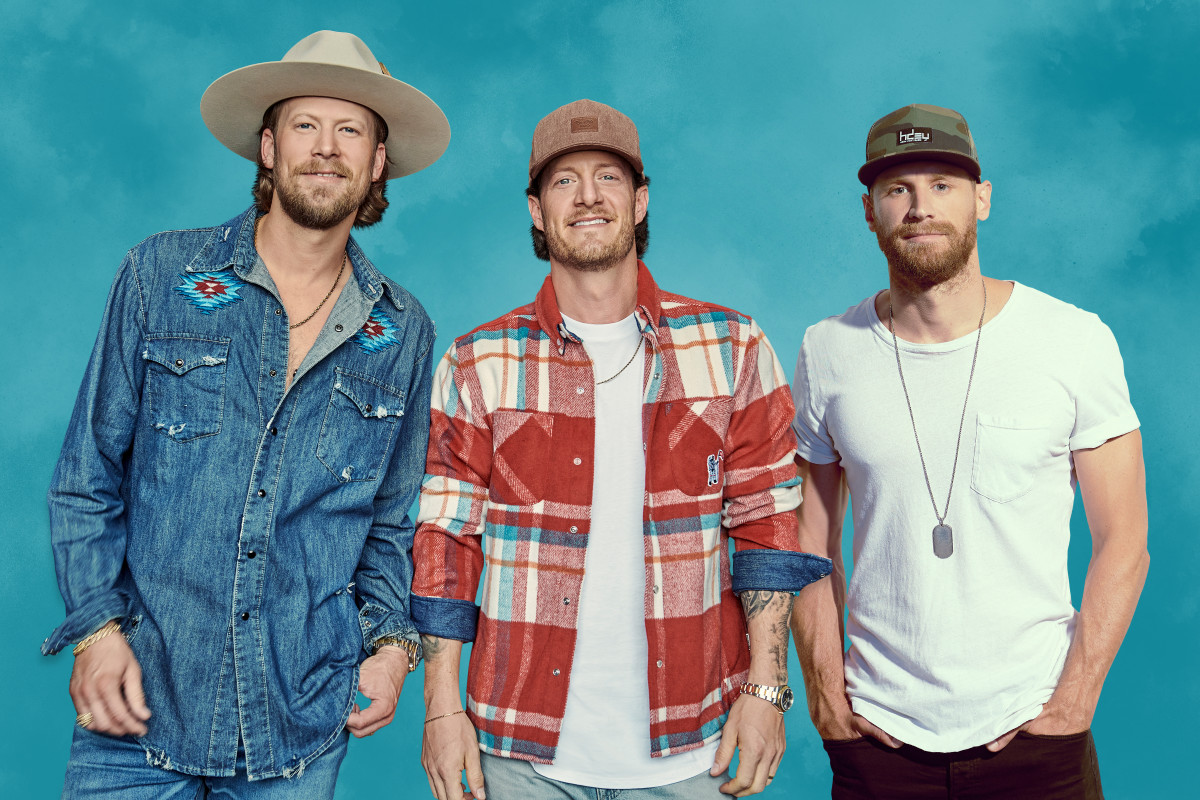
“I no longer want to be alive”
Rice’s golden ticket to stardom actually came from a mistake that happened within six months of his moving to Nashville.
The trio was working on a slow song when Kelley started to hum a melody and pick at a random riff he’d been toying with. They messed around with it, and 45 minutes later, “Cruise” was born.
The song broke records, spending 24 weeks at No. 1 on the Billboard Hot Country Songs charts a little more than a year after it was released on the radio in 2012. The record (thanks in part to a change in methodology that counted more digital plays) held until Sam Hunt’s “Body Like a Back Road” was No. 1 for 34 weeks.
“You start seeing a bunch of songwriters that never give you the time of day at bars,” Rice says. “And all of a sudden they’re walking up to you saying, ‘Hey, man, when are we gonna get that write in?’ And you’re like, ‘Man, you wouldn’t write with me at all two months ago.’
“So it opened a lot of doors and gave me some respect that I’ve been fighting for.”
Garth Brooks says that “Cruise” was both Rice’s blessing and curse. With how long the song stayed at No. 1, the country music legend says, “If you’re the writer on that, you should probably have a key to the city here.”
As Kelley and Hubbard rode Florida Georgia Line’s overnight success to performing in arenas, Rice used the momentum to start piecing together “Ignite the Night,” an album with hit songs “Ready Set Roll,” “Carolina Can” and “Gonna Wanna Tonight.” But as he followed the high, Rice was still facing inner turmoil and hadn’t come to terms with his father’s death.
“Your career is screaming, but then all you do every night is go home and hate life and you're mad at the world,” Rice says. “You're wondering why all these great things are happening, but you hate everything.”
One day in 2013, Rice penned a single phrase that still scares him to this day: I no longer want to be alive.
“That’s something I think you can only write if you don’t care about your life enough to even realize that it’s a problem,” Rice says. “Looking back, obviously, that’s a big, big problem. But when I was writing, I was like, ‘Yeah, what’s the point of this anymore?’ ”
When Rice visited home for Christmas 2013, his mom wrote him a letter and tucked it inside his journal. He didn’t see it until he returned to Nashville, and reading it was the wake-up call he needed to pull his life together. The letter boiled down to her urging him to get help. Despite his musical success, he wasn’t in good shape.
“When your mom writes that kind of letter, it’s like, ‘O.K., this is serious.’ This is not from my friends, not from a coach. This is from my mom,” Rice says. “So that’s when I really started diving into it, and that’s also when I started seeing a lot of stuff that I didn’t [before]. I didn’t know I was depressed. I didn’t know I was mad at the world. I just knew I wasn’t happy.”
Rice decided to give therapy another go when he was preparing to have vocal surgery before joining Jake Owen and Kenny Chesney on The Big Revival Tour. Jenny Muckala, a speech pathologist and voice specialist at Vanderbilt Voice Center, told Rice, “I think you should go see somebody,” and wrote a therapist’s name and number on a Post-it Note.
“I hit him up and didn’t really know why,” Rice says. “But I knew I trusted her, and what she saw was me willing to give up so easily when she knew that wasn’t me.”
The counselor told Rice in one of their first meetings what he already knew but was trying to ignore—he was depressed.
Rice leaned on his support system of friends and family as he worked to come to terms with his mental battles. From a physical standpoint, football prepared him for the rehab battle ahead of him before the biggest musical opportunity of his life.
Owen helped Rice catch his second big break when he introduced him to Chesney. Thanks to his athletic mindset when it came to vocal rehab, Rice was able to join the two friends on their tour in 2015.
Unknowingly, Owen helped Rice achieve his childhood dream. One of the earlier stadiums on that tour was Lucas Oil Stadium, home of the Colts.
Chuck Pagano, who was Indianapolis’s head coach at the time and UNC’s defensive coordinator in 2007, met Rice on Chesney’s bus that night, and told him, “Well, looks like your NFL dreams came true. You’re playing in an NFL stadium tonight.”
They went on to visit Heinz Field (Steelers), Soldier Field (Bears), the Georgia Dome (Falcons), Lincoln Financial Field (Eagles) and Ford Field (Lions). As Rice played in the stadiums he dreamed of growing up, he was taking the first steps to heal and find his footing both in life and in country music, and his friends noticed.
“He’s just gonna be the guy who’s going to be the last guy standing,” Owen says. “That’s who he is. Wasn’t the guy on Survivor? I mean, that’s a perfect example where he’s the guy that’s gonna be like, ‘Yeah, I’ll sign up for something that I’ll be the last guy standing and you put me on an island and starve me for 30 days.’ I mean that’s what I’m saying. I admire that about him. He’s just gonna keep grinding.”
Even as he faced his own battles, Rice has actually been able to help his friends over the years as they faced their fathers’ deaths, like country music singer Cole Swindell, whose dad died in 2013.
“You can never repay somebody for being there during the toughest time of your life,” Swindell says. “When those special days come around, whether it’s his dad’s birthday, my dad’s birthday, the day we lost them, whatever it may be, the holidays, Thanksgiving, Christmas, all that stuff, I feel like we have that special bond where it’s always like, ‘Man, today I’m thinking about you and about your old man.’ ”
Hubbard, who lost his father in 2007, echoed the same sentiment, and added he and Rice want to keep their fathers’ memories and legacies alive while making them proud. It’s an added motivation to “to do our best and to not give up and pursue what we love.”
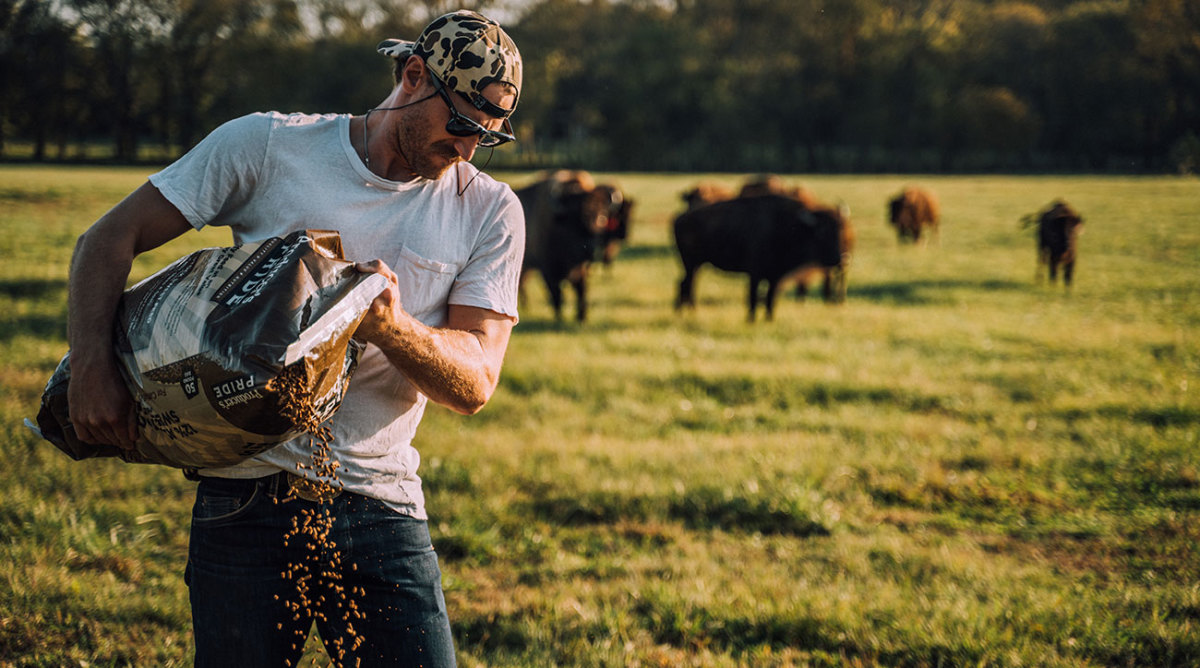
“Keep God first”
Silence fills Twin Eagles Creek Farm, Rice’s home 20 minutes outside boisterous downtown Nashville. But he’s not entirely alone. At least 10 bison roam the open fields while whitetails and turkeys rest elsewhere on the property. And on May 18, a puppy named Jack joined the party.
He’s planning to add chickens to the farm and maybe a mini cow soon. But there will definitely be more bison, Rice says. He’s hoping to make it a full working farm.
The pandemic’s slowing the world down allowed Rice the ability to wake up and look out over his property each morning for the first time since buying the land in 2016. First thing each morning, he makes a cup of coffee and sits either in the breakfast room or out on the porch.
Coffee became a new pandemic addition for the 35-year-old. One morning, he was sitting on his porch in a rocking chair, watching his bison roam the fields, when he thought he needed some. He called one of his guitarists and asked what he needed for one cup a day. Rice began with straight black coffee before adding creamer. Now, he has a foam maker to add froth on top.
“The problem is everything that I do I dive all in. I’m going to try to make a Christmas tree with the foam at some point,” Rice says with a laugh. “I’ll go all in with that. But even so, I think it’s a fun new toy for a bit. And then eventually, I get tired of it, and I’m just like, Pour the damn coffee in the cup.”
The morning quiet does not mirror every day of the past year. In June, as COVID-19 case numbers were skyrocketing in the U.S. and in Tennessee in particular, Rice made headlines at TMZ and elsewhere for putting on a concert for about 1,000 fans with few masks and zero social distancing. He was roundly criticized, including by other performers who had called off shows.
These days, Rice will read The Blue Book by Jim Branch for his morning devotional. Rice was raised in a Christian household, but when his father died, he stopped talking with God. As he worked through therapy, Rice realized he was missing the spiritual aspect. In 2017, Rice went on a five-day retreat for Operation Restored Warrior with a Navy Seal friend.
“That was a big spiritual change and shift in my life that allowed me to realize while I’m really screwed up—but I don’t have to try to fix it all—that I got God, that I got Jesus right there with me,” Rice says. “And the best part about Jesus was he hung out with the most screwed-up guys on the planet, just like me.”
Rice wants to live out his dad’s mantra of “keep God first.” For him, it means to keep showing up to fight, the definition of not giving up. And his friends agree that it’s changed his life.
“The way he lives is an outward expression of an inward change, an inward relationship with himself and the Lord,” Kelley says. “So what you see is God working through him and him working on himself. It’s beautiful.”
Rice says he’s working on listening more to God in the mornings during his quiet time. It’s something that makes his whole day better because he notices a shift in his mentality before he dives into writing.
Throughout the pandemic, Rice dived deep to produce and release “The Album Part II” in May 2020. He and Florida Georgia Line released “Drinkin’ Beer. Talkin’ God. Amen.” in November and recorded the music video, which was released at the end of March, on his farm.
But when he tweeted that the single would be dropping, he faced major backlash for the second time during the pandemic. His tweet read, “Just lost my taste and smell. Weird. Also, dropping a single at midnight.” He later followed it up by saying, “On a real note. Don’t have covid. But I’m dropping a single tonight. With 2 guys that I learned a lot from. Respect the hell out of @FLAGALine. And 10 years after we started doing music together and lived together, we’re at it again. Drinkin beer. Talkin God. Amen.” Rice was criticized, with many noting the joke came on the heels of the previous controversy five months before.
To close out 2020, Rice put together three livestream shows, this time more quietly, on his farm over the span of three weekends—one acoustic by himself on Sleepy Hollow Road, one with a few of his bandmates around a fire and the third a full show at his barn performed in front of a small group. Lee Brice, a country music star, lives less than a mile away, and said he could hear the concerts from his farm. Given the pandemic, it was surreal for Brice to hear it.
And now with the light starting to appear more at the end of the pandemic’s tunnel, Rice is releasing “The Album” on May 28.
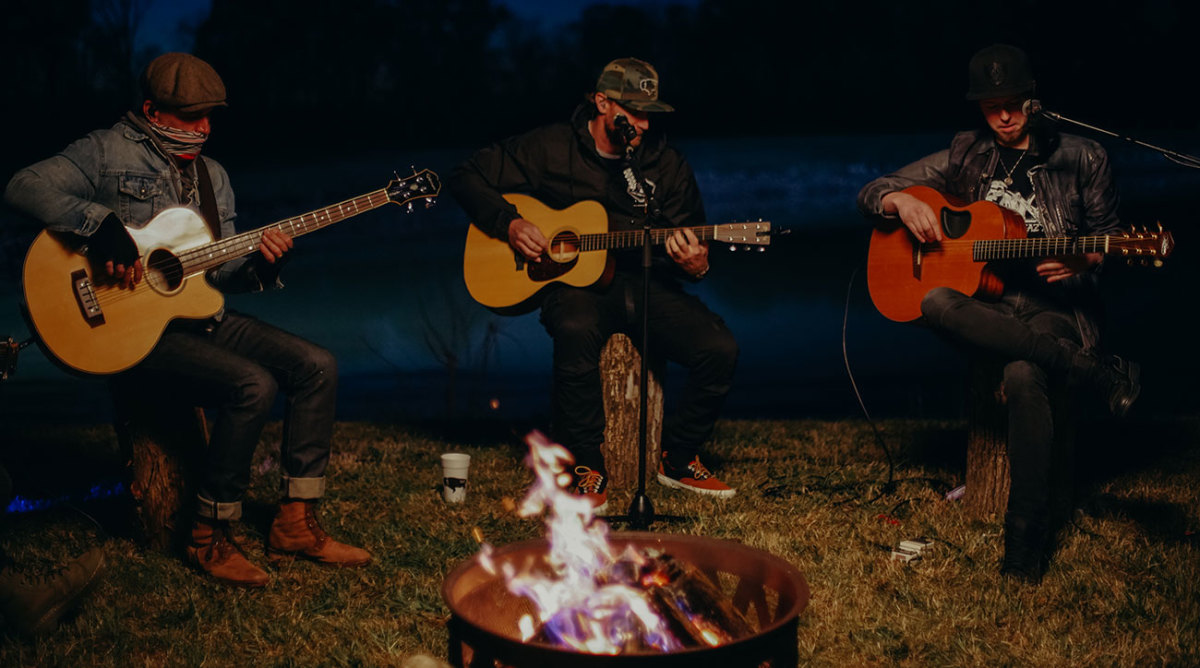
While on a retreat in college, Rice was asked to write down where he saw himself in five and 15 years. He wrote, “I would love to play out my dreams of playing in the National Football League, and then, I’d like to pursue another dream.” he says. “I wrote down that I [would] love to pursue a really cool dream of singing country music for a living.”
From ACC football to Jimmie Johnson’s pit crew, and Nashville to Nicaragua, Rice has gotten to live out more dreams than most.
Country music icons now praise him the way he once hoped NFL scouts would. Brice called him one of the most dedicated people he knows, and Owen said Rice is one of those few people he could call in the middle of the night if he were stranded and he would show up immediately. Swindell said Rice taught him how to chase your dreams while Brooks called him the “voice of the next generation.”
But Rice says he’s far from perfect. He remembers talking with a guy who works at Jack Daniel’s about the shame Rice got for the summer concert and the tweet from the fall, and that individual said people thought of the famed distiller as a flawed hero.
“He said to me, ‘That’s why I think of you as a flawed hero. People praise you, people hate you, people whatever. At the end of the day, no matter what you’re flawed, but because you keep getting back up, because you live your life, because you learn from your mistakes and because you keep pushing forward, that’s the hero side of it.’ ”
Rice added he hopes people learn from his mistakes when they hear his story: “I hope they saw someone who meant well. I hope they saw someone who tried to do the very, very best with what God gave him and messed up along the way, but received grace along the way as well. And I think that’s a story of life—redemption.”
More from Madeline Coleman:
• Chase Elliott’s Title Quest Carrying on a Family Tradition
• Denny Hamlin Embraces Being a Driver, Owner, Girl Dad
• Football, Bounty Hunting, NASCAR: T.J. Semke’s Amazing Voyage
